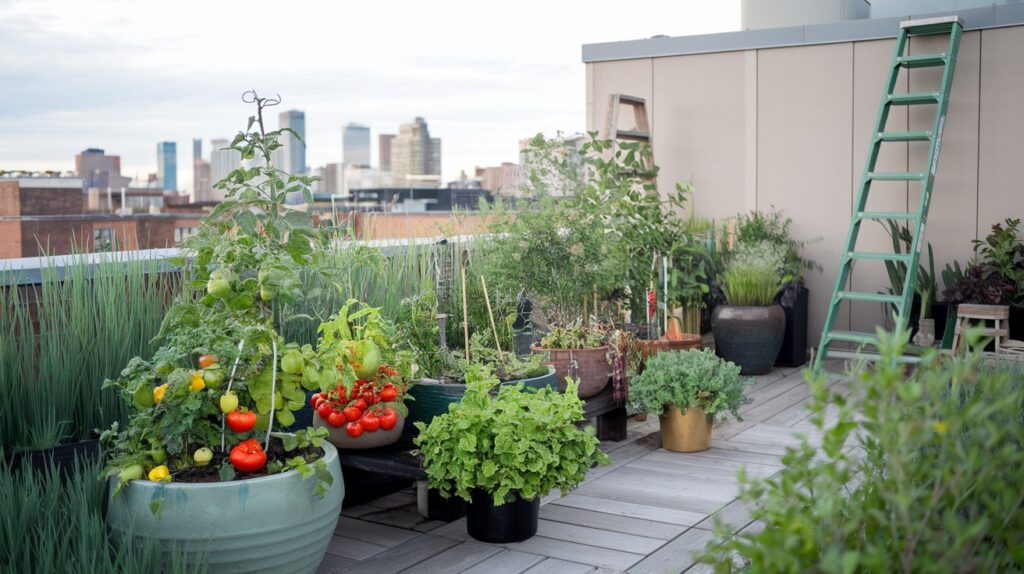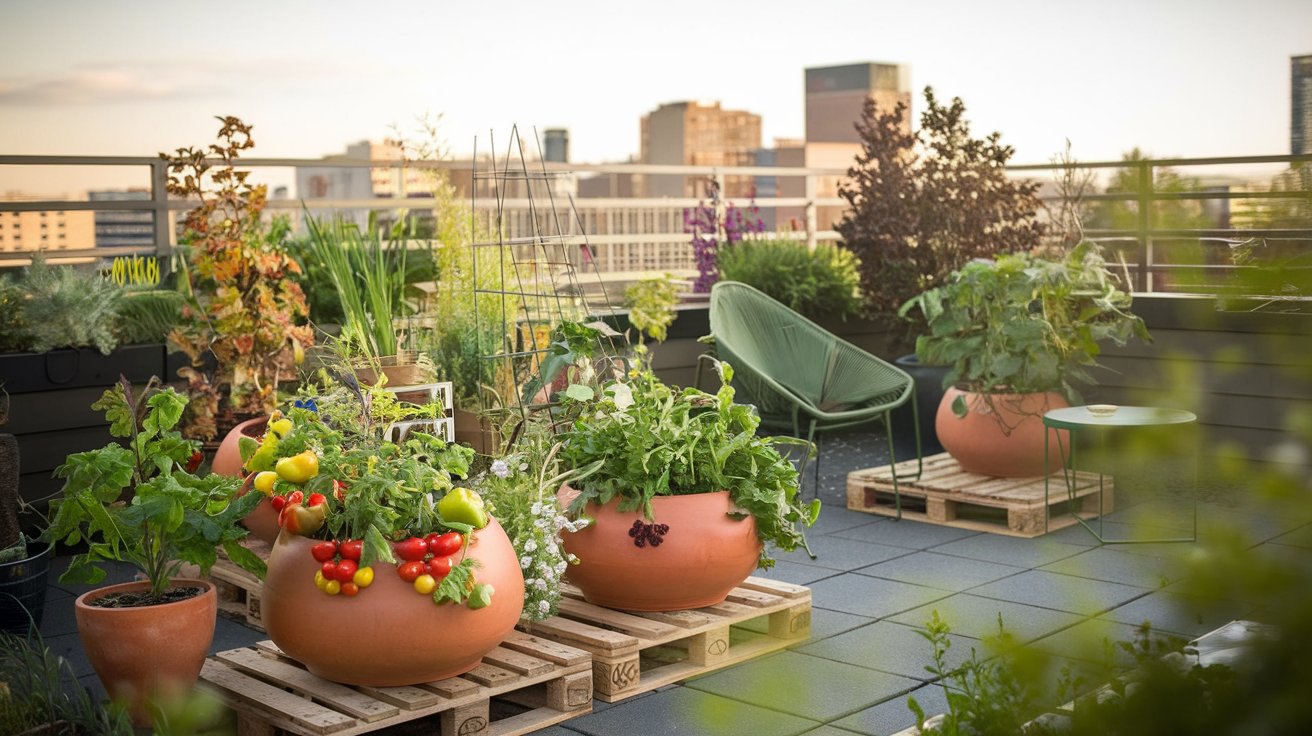As the world becomes increasingly urbanized, city dwellers are finding creative ways to bring nature back into their lives. Urban gardening has become a popular trend, with residents transforming rooftops, balconies, and even windowsills into lush green spaces. But urban gardening is more than just a hobby – it’s a powerful tool for creating a sustainable future.
Key Facts and Statistics
- Market Size: The urban farming market was valued at approximately $213 billion in 2020 and is projected to grow at a compound annual growth rate (CAGR) of 2.8% from 2021 to 2026, indicating a rising interest in local food production and sustainable practices.
- Food Security: With the global population expected to reach 9.7 billion by 2050, urban gardening offers a practical solution for enhancing food security. It allows communities to grow their own fresh produce, reducing reliance on long-distance supply chains that can be fragile during crises.
- Environmental Benefits: Urban gardens act as carbon sinks, absorbing pollutants and helping to mitigate the urban heat island effect. They can significantly improve air quality by filtering harmful pollutants and releasing oxygen through photosynthesis.
- Biodiversity: Urban gardening promotes biodiversity by creating habitats for pollinators such as bees and butterflies, which are essential for ecosystem health and crop production. These gardens contribute to the ecological balance in urban settings.
- Community Engagement: Community gardens foster social interaction and cooperation among residents, promoting a sense of belonging and shared purpose. They serve as hubs for education and cultural exchange, enhancing community ties.
- Health Benefits: Gardening has therapeutic effects, reducing stress and improving mental health. The physical activity associated with gardening also encourages a healthier lifestyle, making it a beneficial practice for urban dwellers
The Benefits of Urban Gardening
Urban gardening is increasingly recognized as a vital practice for promoting sustainability, enhancing food security, and fostering community engagement in urban environments. As cities expand and green spaces diminish, urban gardening offers a solution to reconnect city dwellers with nature and address pressing environmental challenges.

Urban gardening offers a wide range of benefits, from improving air quality to providing a sense of community. Some of the most significant advantages include:
- Improved air quality: Plants absorb carbon dioxide and release oxygen, making the air cleaner and healthier to breathe.
- Increased food security: Urban gardens can provide fresh produce, reducing reliance on industrial agriculture and transportation.
- Mental health benefits: Gardening has been shown to reduce stress and improve mood.
- Community building: Urban gardens can serve as community hubs, bringing people together and fostering a sense of connection.
Getting Started with Urban Gardening
Starting an urban garden can seem daunting, especially for those with limited space. However, there are many creative solutions for cultivating a green space in the city:
- Container gardening: Use pots, planters, and containers to grow plants on balconies, rooftops, or windowsills.
- Vertical gardening: Utilize trellises, arbors, and wall-mounted planters to maximize space.
- Hydroponics and aeroponics: Grow plants in nutrient-rich solutions rather than soil, perfect for indoor spaces.
- Community gardens: Join forces with neighbors to create a shared green space.
Environmental Impact
Urban gardening plays a significant role in mitigating the environmental effects of urbanization. It helps reduce carbon emissions by minimizing the need for long-distance food transportation and provides natural air filtration through plants, which absorb carbon dioxide and release oxygen. Additionally, urban gardens contribute to biodiversity by creating habitats for various species, thus promoting ecological balance within city ecosystems.
Food Security
With the global population projected to reach 9.7 billion by 2050, food security is a growing concern. Urban gardening enables individuals and communities to produce their own fresh fruits and vegetables, particularly in food deserts where access to healthy food is limited. This localized food production not only improves nutrition but also empowers communities to take control of their food sources.
Community Engagement
Urban gardens serve as communal spaces that foster social interaction and cooperation among residents. They provide opportunities for neighbors to collaborate on gardening projects, share knowledge, and participate in educational workshops about sustainable practices. This engagement strengthens community ties and promotes a sense of belonging.
Mental and Physical Well-being
Engaging in gardening activities has been shown to enhance mental health by reducing stress and improving mood. The physical activity involved in gardening also contributes to a healthier lifestyle. Urban gardens offer a peaceful retreat from the hustle and bustle of city life, allowing individuals to connect with nature and experience a sense of accomplishment.
Techniques for Urban Gardening
Urban gardening can be adapted to various small spaces, making it accessible to city dwellers. Techniques include:
- Vertical Gardening: Utilizing trellises and wall-mounted containers to grow plants upward, maximizing limited space.
- Container Gardening: Growing plants in pots or containers, suitable for balconies and windowsills.
- Hydroponics: A soil-less method of cultivation that uses nutrient-rich water, ideal for small areas.
Educational Opportunities
Urban gardening initiatives can also serve as educational platforms, teaching children and adults about sustainability, ecology, and nutrition. Schools can integrate gardening into their curricula, providing hands-on experiences that foster environmental stewardship among future generations.
Overcoming Challenges
Urban gardening comes with its own set of challenges, from limited space to soil contamination. However, with a little creativity and resourcefulness, these obstacles can be overcome:
- Soil contamination: Use raised beds or container gardens to avoid contaminated soil.
- Limited space: Opt for compact or dwarf varieties of plants, and utilize vertical space.
- Pests and diseases: Use organic pest control methods and practice good garden hygiene.
The Final Words
Urban gardening is a powerful tool for creating a sustainable future, even in the midst of bustling cities. By cultivating green spaces, city dwellers can improve air quality, increase food security, and foster a sense of community. Whether you have a small balcony or a spacious rooftop, there’s no excuse not to get started with urban gardening today.
Optimized images: Use relevant images with alt tags and descriptions, such as “urban garden on rooftop” or “container gardening on balcony”.

